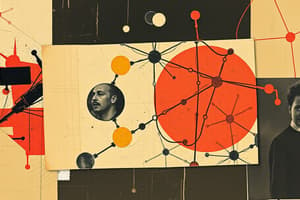Podcast
Questions and Answers
What is the charge of a cation?
What is the charge of a cation?
- Net negative charge due to excess electrons
- Net charge that can vary based on the atom
- Net positive charge due to lost electrons (correct)
- Neutral charge as it has an equal number of protons and electrons
How is a monatomic anion named?
How is a monatomic anion named?
- By using Roman numerals to denote charge
- By using the element's name followed by 'ion'
- By using Greek prefixes to indicate the number of atoms
- By adding 'ide' to the element's name and adding 'ion' (correct)
Which of the following describes a polyatomic ion?
Which of the following describes a polyatomic ion?
- An ion that can only be found in liquid states
- An ion with a negative charge only
- An ion composed of only one atom
- An ion made of a combination of two or more atoms (correct)
What is the Stock system used for in the context of ions?
What is the Stock system used for in the context of ions?
Which statement about sodium chloride (NaCl) is correct?
Which statement about sodium chloride (NaCl) is correct?
Which polyatomic ion is represented by the formula HCO3−?
Which polyatomic ion is represented by the formula HCO3−?
Which of the following correctly names the ionic compound MgO?
Which of the following correctly names the ionic compound MgO?
What is the charge of the dichromate ion (Cr2O7)2−?
What is the charge of the dichromate ion (Cr2O7)2−?
Which of the following ions is an oxoanion with a higher oxidation state than the chlorate ion (ClO3−)?
Which of the following ions is an oxoanion with a higher oxidation state than the chlorate ion (ClO3−)?
What is the correct formula for potassium hydrogen phosphate?
What is the correct formula for potassium hydrogen phosphate?
Which ion is represented by the formula SCN−?
Which ion is represented by the formula SCN−?
Which of these ions has a 3− charge?
Which of these ions has a 3− charge?
Which of the following compounds contains an iron cation with a +3 charge?
Which of the following compounds contains an iron cation with a +3 charge?
What is the common name for the ion with the formula NO3−?
What is the common name for the ion with the formula NO3−?
Which polyatomic ion contains more oxygen atoms than the sulfate ion (SO4)2−?
Which polyatomic ion contains more oxygen atoms than the sulfate ion (SO4)2−?
Flashcards are hidden until you start studying
Study Notes
Atomic Ions
-
A single atom with a positive or negative charge is called an atomic ion.
-
Cations: Atoms that lose one or more electrons have a positive charge.
- For example, a sodium (Na) atom loses one electron to become a sodium cation (Na+).
-
Anions: Atoms that gain one or more electrons have a negative charge.
- For example, a chlorine (Cl) atom gains one electron to become a chloride anion (Cl-).
-
Ionic Compounds: Compounds formed from the electrostatic attraction between cations and anions.
- A common example is sodium chloride (NaCl), also known as table salt.
Naming and Formulas of Ionic Compounds
-
Roman Numerals: Cations with multiple possible charges are designated with Roman numerals in the Stock system.
- For example: Mn2+ is manganese(II) ion.
- Note: The Roman numeral indicates the charge on the cation
-
Monatomic Anions: Named by changing the ending of the element's name to "-ide" and adding the word "ion".
- For example, the chlorine anion (Cl-) is called chloride ion.
Polyatomic Ions
- Polyatomic ions are composed of two or more atoms bound together and carrying a net charge.
- Examples: ammonium (NH4+), hydroxide (OH-), sulfate (SO42-), carbonate (CO32-).
Formulas of Ionic Compounds
-
Ionic compounds are formed when the total positive charge of the cations equals the total negative charge of the anions.
-
Steps to Determine Formulas:
- Determine the charges of the ions involved.
- Find the least common multiple of the charges.
- Use subscripts to indicate the number of each ion needed to balance the charges.
-
Example: Aluminum oxide (Al2O3).
- Aluminum ion (Al3+).
- Oxide ion (O2-).
- The least common multiple is 6, so we need two aluminum ions (2 x 3 = 6) and three oxide ions (3 x 2 = 6).
Naming Ionic Compounds
-
Steps to Name Ionic Compounds:
- Name the cation first.
- If the cation has multiple charges, use a Roman numeral in parentheses after the cation name.
- Name the anion second.
- If the anion is polyatomic use the name from a table of common polyatomic ions.
-
Example: Iron(III) sulfate (Fe2(SO4)3)
- Iron (Fe) is the cation and has a charge of +3.
- Sulfate (SO42-) is the anion.
Oxoanions
-
**Oxoanions:**Polyatomic anions containing oxygen and at least one atom (the "central atom") of another element.
- Common Examples: chlorate ion (ClO3-), nitrate ion (NO3-), sulfate ion (SO42-).
-
Naming Oxoanions:
- -ate: Base name for the ion.
- -ite: One less oxygen atom than the -ate ion.
- per...ate: One more oxygen atom than the -ate ion.
- Example:
- The chlorate ion (ClO3-) has one less oxygen than the perchlorate ion (ClO4-).
- The chlorite ion (ClO2-) has one less oxygen atom than the chlorate ion (ClO3-).
Studying That Suits You
Use AI to generate personalized quizzes and flashcards to suit your learning preferences.



